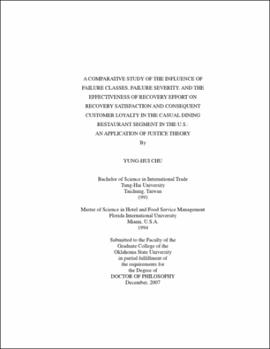| dc.contributor.advisor | Palakurthi, Radesh R. | |
| dc.contributor.author | Chu, Yung-Hui | |
| dc.date.accessioned | 2013-11-26T08:33:20Z | |
| dc.date.available | 2013-11-26T08:33:20Z | |
| dc.date.issued | 2007-12 | |
| dc.identifier.uri | https://hdl.handle.net/11244/7210 | |
| dc.description.abstract | Scope and Method of Study: The purpose of the study is to study the comparative effectiveness of recovery effort on recovery satisfaction and customer loyalty in terms of system failures and personnel failures in casual dining restaurants in the U.S. Quasi-experimental repeated-measures design is employed. The target population is the customers in the casual dining restaurants. Data is collected from the sample of undergraduate and graduate students enrolled in the School of Hotel and Restaurant Administration at a Midwestern land-grant university. Analysis of variance, analysis of covariance, and hierarchical regression analysis are employed to analyze data. | |
| dc.description.abstract | Findings and Conclusions: This study may have imperative implications for casual dining restaurant managers. The most important outcome of the research is a summary of the class of recommended recovery effort based on realistic failures (system failures and personnel failures) that occur every day in casual dining restaurants across the country. It is expected that the restaurant managers can use these recommended methods as a guideline for fixing failure problems that may occur in their restaurants. Overall, speed of fixing problem and free meal for the current visit is more favorable than the other justices in terms of the recovery effort and recovery satisfaction; however, it depends on the failure classes and the situation of controlling for justice. Additionally, personnel recovery satisfaction has more impact on customer loyalty, behavioral loyalty, and attitudinal loyalty than system recovery satisfaction. Lastly, confounding effect of failure severity has effects on personnel recovery satisfaction, but not on system recovery satisfaction. Confounding effect of failure severity also has various effects on system recovery efforts and personnel recovery efforts. However, confounding effect was not found to be significant in terms of the relationship between recovery satisfaction and customer loyalty. | |
| dc.format | application/pdf | |
| dc.language | en_US | |
| dc.rights | Copyright is held by the author who has granted the Oklahoma State University Library the non-exclusive right to share this material in its institutional repository. Contact Digital Library Services at lib-dls@okstate.edu or 405-744-9161 for the permission policy on the use, reproduction or distribution of this material. | |
| dc.title | Comparative study of the influence of failure classes, failure severity, and the effectiveness of recovery effort on recovery satisfaction and consequent customer loyalty in the casual dining restaurant segment in the U.S.: An application of Justice Theory | |
| dc.contributor.committeeMember | Qu, Hailin | |
| dc.contributor.committeeMember | Leong, Jerrold K. | |
| dc.contributor.committeeMember | Johnson, Christine A. | |
| osu.filename | Chu_okstate_0664D_2503 | |
| osu.accesstype | Open Access | |
| dc.type.genre | Dissertation | |
| dc.type.material | Text | |
| dc.subject.keywords | service recovery | |
| dc.subject.keywords | failure severity | |
| dc.subject.keywords | satisfaction | |
| dc.subject.keywords | loyalty | |
| dc.subject.keywords | justice theory | |
| thesis.degree.discipline | Hotel and Restaurant Administration | |
| thesis.degree.grantor | Oklahoma State University | |
